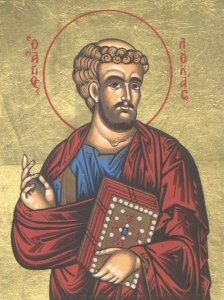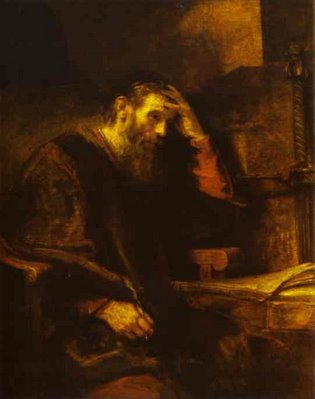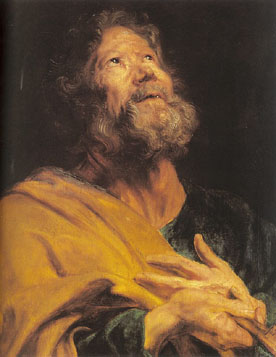In Greek mythology there is portrayed a villainous son named Procrustes, of his father Poseidon, who would arbitrarily prescribe ruthless, torturous phenomenon for patrons of his hostel. He would force his travelers to fit into his "procrustean bed" by stretching his victims or severing off their limbs.
In much the same way, there have been men throughout the ages, many who also today, are passing abhorrent doctrine and skewed theology off as authentic Christianity, that have abandoned the truth of God's Word (1 Tim. 4:1), having laid it upon the "procrustean bed" of deceived, depraved minds (1 Tim. 6:5; Titus 1:15) stretching its truth or lopping it off to suit itching ears (2 Tim. 4:3), wayward hearts (2 Pt. 2:2), and perverted religious systems, creeds, rituals and ceremonies (Col. 2:6-18). This is spiritual treason at its core! The Apostle Paul warns of such treason and pronounces sentence on those who promulgate this distortion of doctrine and desertion of Christ for a different gospel when he says:
Spiritual TreasonDoctrines of demons abounded in the Apostles day (1 Tim. 4:1). Endless genealogies (Ibid 1:4), myths (Ibid), strange doctrines (Ibid 1:3), worldly fables (Ibid 4:7f), and hucksters peddling the Word of God for profit (2 Cor. 2:17) - but Paul was called for the defense of the gospel (Phil. 1:16) and he would not shrink from the duty of "declaring the whole council of God" (Acts 20:27). Though some were out to make retail of the truth and sell it for whatever worldly prominence, power or paragon they might obtain, truth was a non-negotiable to this great saint as it was to Polycarp, Ireneaus, Ignatius, Athanasius, Augustine, Basil, Ambrose, Tertullian, Chrysostom, Jerome and other great church Fathers. These men sacrificed their lives for the Eternal Logos and the written logos. They took there stand firmly on the Word of God without compromise and without regret. Athanasius knew this cost when he said, "The calumniating Greek ridicule us and set up a broad laugh at us, because we regard nothing so much as the cross of Christ."(1) They guarded the trust! (1 Tim. 6:20).
The church should not be the place where sin is entertained, scandals abound and disobedience is tolerated, but the church should be what Paul had declared that it is, "the pillar and support of the truth." (1 Tim. 3:15) This is the purpose of all theology, of all ecclesiology, of all music and of all history to preserve, promote, protect and preach the Word! But since Lucifer is a subtle and twisted foe, he will try to pervert all sound doctrine into damning apostasy. "[He, the devil]...does not stand in the truth, because there is no truth in him" (John 8:44).
All false systems throughout church history will have an appearance of orthodoxy but are in reality "white-washed" tombs of abhorrent prevarication. Whether it be the additional revelations of the Montanists; the dualistic and demiurgic mediatorial intellectualism of the Gnostics; the subordinationist Trinitarian theology of the Arians; the kenotic iconoclasm of the Ebionites and Socinians; or the debauched sacradotalism of the greatest of all "angel of lights" (2 Cor. 11:14) - the Roman Catholic Church;
the genuine gospel was always blended with the leaven of error to produce heresy. As Louis Berkhof quotes Professor Walther when commenting on the syncretistic movement in Gnosticism, he so profoundly says,
"Gnosticism...is a stealing of some Christian rags to cover heathen nakedness! This corresponds with Seeburg when he speaks of it as an 'ethnicizing of Christianity.'" (emphasis added)
 A Workman Unashamed
A Workman UnashamedPaul declared,
"Do your best to present yourself to God as one approved,[a] a worker who has no need to be ashamed, rightly handling the word of truth." This is the duty of every faithful pastor--to rightly divide God's Word--to cut it straight. If he does so, he will be a workman unashamed and approved unto God. This should produce godly fear in every under-shepherd of the flock of God. Wrongly dividing the Word will bring judgment upon you (James 3:1) and cause the body of Christ to suffer. Think of Paul's exhortation to young Timothy; warning the church of two men who failed in this task and their skewed sermons were nothing but cancerous to the body of Christ.
”But avoid irreverent babble, for it will lead people into more and more ungodliness, and their talk will spread like gangrene. Among them are Hymenaeus and Philetus, who have swerved from the truth, saying that the resurrection has already happened. They are upsetting the faith of some. (2 Tim. 2:16-18a) When one is injured and gangrene sets in, the only hope to stop the gangrene from spreading further and protect the health of the rest of the body is to amputate the diseased limb. In the same way, when gangrenous teaching finds its way within the church that can damage and disease the entire body, the only remedy for this disorder of doctrine is the amputation of aberrancy so that its poison will not effect the rest of the body of Christ!
As Tertullian so insightfully says,
"truth is just as much opposed by an adulteration of its meaning as it is by a corruption of its text." This, however, presupposes an authoritative "rule and standard" that could be "adulterated...and corrupted." Schaff writes penetratingly when saying,
"The heretical canon of the Gnostic Marcion, of the middle of the second century, consisting of a mutilated Gospel of Luke and ten of Paul's epistles, certainly implies the existence of an orthodox canon at that time, as heresy always presupposes truth, of which it is a caricature." (emphasis added) Heresy always has an element of truth to it and that is why the Councils and Synods, the development of the Creeds had to not only unmask the imposter of the genuine faith but also contend for and reaffirm the truth of authentic faith! (Jude 3)
Contend for THE FaithThese were not casual intellectual ping pong matches these men engaged in as though they were the next target on "Firing Line" with William Buckley, Jr. The preservation of truth, the development of the canon, the stance for sound doctrine (uncorrupted and unadulterated) cost many of the early Fathers (from the time of the ascension of Christ to the time of Constantine- and in some cases beyond) their reputations, separation from their families, exile and banishment, torture, persecution and ultimately their lives. The pages of church history cannot be studied dispassionately when the very pages of that history are written with the blood of the saints that held fast the faithful word and did not recant! The Bible is the most sacred thing we will ever hold in our hands in this life. The early church leaders did not shrink from declaring the whole council of God (Acts 20:27) and rightly dividing the word of truth (2 Tim. 2:15). May we not dishonor them nor our Lord by taking lightly the task of preserving orthodox historical biblical Christianity.
To develop a biblical perspective of history a few considerations are necessary: a proper view of God; a proper view of man; and a proper view of truth. History can be and is didactic, political, sociological, biographical, economic, geographic and synthetic. But most importantly history is first and foremost theological. Newman says,
"the Christian scholar rejoices in all that is Christlike and heroic, laments the corruptions and perversions of the past, and is most deeply concerned for the honor and purity of Christianity of the present and future.”Our faith is not built upon the opinions of the early church fathers, their traditions or councils, letters or debates apart from the attestation of Scripture. Though we today owe “the fathers—the divines” a tremendous debt for the faithful warrant and witness preserved on biblical truth; but we must be careful to fathom that our faith is built solely upon the authority, sufficiency and exhaustiveness of Holy Scripture. Truth must always take precedence over tradition - and tradition must always be examined in light of truth! If not, then we are in danger of turning the wonderful recognized traditions of these divines into what I call,
"Protestant Popery!" God forbid!
No Creed but ChristSamuel Davies, that tremendous 18th century divine said,
"I may indeed believe the same things which Luther or Calvin believed: but I do not believe them on the authority of Luther or Calvin, but upon the sole authority of Jesus Christ, and therefore I should not call myself by their name, as one of their disciples, but by the name of Christ, whom alone I acknowledge as the Author of my religion, and my only Master and Lord." "Follow me as I follow Christ" (1 Cor. 11:1) is the clarion call of church history. For it is as someone has stated, history is nothing less than "His-story!"
As the early church fathers followed Christ, we follow them. As they affirmed the Scriptures we accept them and their teaching. As the councils affirmed and upheld biblical truth, without addition and without deletion, we receive them. As the bishops and episcopates held fast the faith without compromise, we embrace them. But remove the standard and rule for all conduct of God’s Word and depart from the heavenly plumbline (Amos 7:8), which governs our souls' security and surety for eternity and insures our daily duty and ecclesiastical obligations to elders and laity, from the essence of their dogma, then we must jettison their words and place under suspect their writings, contributions and authority.
The Sufficiency of ScriptureThe uniqueness of Scripture is that it is axiomatic, self-evident truth. Psalm 19:7-9 gives us the most comprehensive statement on the authority and sufficiency of Scripture found anywhere in the Bible.
• The law of the Lord is perfect, RESTORING THE SOUL.
• The testimony of the Lord is sure, MAKING WISE THE SIMPLE.
• The precepts of the Lord are right, REJOICING THE HEART;
• The commandment of the Lord is pure, ENLIGHTENING THE EYES.
• The fear of the Lord is clean, ENDURING FOREVER;
• The judgments of the Lord are true; they are RIGHTEOUS ALTOGETHER.
Here we read that the word of our Lord is perfect, sure, right, pure, clean and true. Nothing in its pages is lacking; nothing is defiled, adulterated, corrupted, unclean or unholy. Every word is without error! Why? The Psalmist says it is, "of the Lord." And look what it accomplishes: it restores the soul (salvation); it makes the simple wise (erudition); it rejoices the heart (exultation); it enlightens the eyes (illumination); it endures forever (glorification); and it produces comprehensive righteousness to daily live by (sanctification). No wonder this word was sweeter than any earthly delight and more valuable to David than any earthly treasure (Psalm 19:10-11). This was the faithful word that Jeremiah proclaimed (Jer. 11:1-5); that David sang (Psalm 119:54); that Saul apostatized (1 Sam. 15:20-23); that Daniel honored (Daniel 2:20-23); that Ezekiel preached (Ez. 37:1-10); that Jonah hid from (Jonah 1:1-3); that Moses delievered (Ex. 20:1-18); that Job trusted in (Job 1:20-22); that God has exalted even above His name (Psalm 138:2).
This is the language of tradition (the paradosis) that was handed down through the prophets to the Apostles. "God, after He spoke long ago to the fathers in the prophets in many portions and many ways." (Heb. 1:1) These men "were entrusted with the oracles of God" (Rom. 3:2b); "to whom belongs...the covenants and the giving of the Law...and the promises" (Ibid 9:4); which Stephen heralded, "...who was with our fathers; and he received living oracles to pass on to you" (Acts 7:38); this was done by the "mouth of His holy prophets from of old" (Luke 1:70).
It is this Word that Peter affirmed "for no prophecy was ever made by an act of human will, but men moved by the Holy Spirit, spoke from God." (2 Peter 1:21) The Apostles of Jesus Christ were used by the Lord as His agency by which the New Testament was delivered to the church as the prophets had been used in times of old. As the formation of the New Testament canon was unfolding, the letters of the Apostles were sent to the churches, not as the opinions of traveling missionaries, but as the Word of God (1 Thess. 2:13). This was their authority - infallible truth given to the churches. We see this occurring directly following Pentecost for we read in Acts 2:40, "they were continually devoting themselves to the Apostles' teaching..." Here we are given profound perspicacity into the Apostolic Fathers teaching as doctrine to be given to the entire church. And it is something that they gave constant devotion to.
 The Apostles and The Word of God
The Apostles and The Word of GodAs the end of the Apostolic age came to a close, we are given a few passages which already recognize the Apostles' teaching as canonical. 1 Timothy 5:18, "For the Scriptures say, you shall not muzzle the ox while he is threshing, and the laborer is worthy of his wages" (emphasis added). Here we have a reference to the Scriptures as being a dual quote from Deut. 25:4 and Luke 10:7. This is a crucial passage linking the Pentateuch with the Gospel of Luke. (This is the gospel that Marcion was have said to mutilate. Marcion judged the Book, forgetting that the Book eternally judges him!) We see Paul quoting from the Gospels, to the Corinthian church (Luke 22:20) as Scripture, when he says, "This cup is the new covenant in My blood, do this as often as you drink it, in remembrance of Me."
Even Peter acknowledges the writings of Paul as holy canon when he says, "according to the wisdom given him, wrote to you, as also in all his letters, speaking in them of these things, in which are some things hard to understand, which the untaught and unstable distort, as they do also the rest of the Scriptures, to their own destruction." (2 Peter 3:15b-16) This is significant, for Peter is equating Paul's letters with Scripture.
And this is “once for all delivered to the saints faith” that we are to “contend for.” May the church in America today believe once again in the authority, sufficiency, veracity and exclusivity of Scripture again.
-this has been an encore presentation-
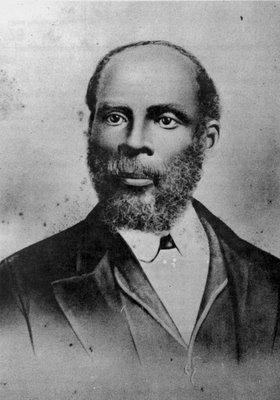 February is traditionally known as black history month. While some in our society unfortunately use it to play what has commonly become known as "the race card", as believers in the Lord Jesus Christ, we can 'redeem' it by honoring one of the Lord's servants.
February is traditionally known as black history month. While some in our society unfortunately use it to play what has commonly become known as "the race card", as believers in the Lord Jesus Christ, we can 'redeem' it by honoring one of the Lord's servants.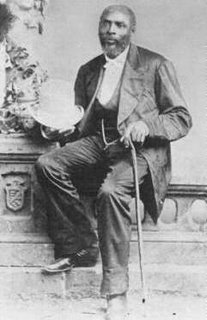 One of the great Slave preachers, Jasper became a noted funeral preacher long before the Civil War. Noted for his fervid zeal, gifted imagery, and colorful oratory, as a speaker Jasper was much in demand. He preached in many sections of Virginia and adjoining states. During his August vacation, he conducted famous all-day camp meetings in the country. Sunday after Sunday he could be seen leading his flock to be baptized in the James River. He was known to have baptized as many as 300 people in four hours. He reached the height of his aspiration in 1867 when he organized the Sixth Mount Zion Baptist Church. He gained national distinction in 1878 when he first preached his famed "DE SUN DO MOVE" sermon, which he later delivered by invitation more than 250 times, and once before the entire Virginia General Assembly. This sermon was his effort to prove through biblical references that the sun revolves around the earth. Black men were not allowed to preach in regular churches in those days unless supervised by white ministers. But Jasper's pointed and powerful messages soon drew a growing crowd, black and white, to hear him preach.
One of the great Slave preachers, Jasper became a noted funeral preacher long before the Civil War. Noted for his fervid zeal, gifted imagery, and colorful oratory, as a speaker Jasper was much in demand. He preached in many sections of Virginia and adjoining states. During his August vacation, he conducted famous all-day camp meetings in the country. Sunday after Sunday he could be seen leading his flock to be baptized in the James River. He was known to have baptized as many as 300 people in four hours. He reached the height of his aspiration in 1867 when he organized the Sixth Mount Zion Baptist Church. He gained national distinction in 1878 when he first preached his famed "DE SUN DO MOVE" sermon, which he later delivered by invitation more than 250 times, and once before the entire Virginia General Assembly. This sermon was his effort to prove through biblical references that the sun revolves around the earth. Black men were not allowed to preach in regular churches in those days unless supervised by white ministers. But Jasper's pointed and powerful messages soon drew a growing crowd, black and white, to hear him preach.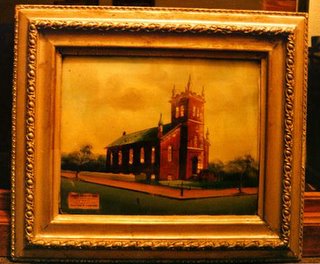 In March of 1901, John Jasper preached to his congregation for the last time on the subject, "Ye Must Be Born Again." He urged his people to prepare for death, which he knew was coming soon for him. At his funeral, Dr. Hatcher said, "Every motion of his was made to exalt the Lord of his life." At his funeral, Reverend Hatcher delivered the eulogy, calling him "a prince of his tribe." Jasper is buried at Woodland Cemetery in Richmond, which also is the final resting place of tennis great Arthur Ashe.
In March of 1901, John Jasper preached to his congregation for the last time on the subject, "Ye Must Be Born Again." He urged his people to prepare for death, which he knew was coming soon for him. At his funeral, Dr. Hatcher said, "Every motion of his was made to exalt the Lord of his life." At his funeral, Reverend Hatcher delivered the eulogy, calling him "a prince of his tribe." Jasper is buried at Woodland Cemetery in Richmond, which also is the final resting place of tennis great Arthur Ashe.





